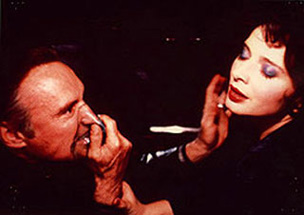A-List: Blue Movies
By Michael Bentley
September 29, 2005
BoxOfficeProphets.com

Blue Velvet
One of the high points of David Lynch's career, Blue Velvet is a sweeping neo-film noir look at the dark corners of white-picket fence suburbia. It's sort of a precursor to American Beauty. Early on in the film, college student Jeffrey Beaumont (Kyle MacLachlan) finds a severed human ear in a field near his home. And that is one of the less bizarre parts of the movie. His discovery takes him on a fateful journey involving the beautiful girl next door (Laura Dern), a mysterious nightclub signer (Isabella Rossellini), and a psychotic madman (Dennis Hopper) who considers Pabst Blue Ribbon to be the champagne of beers. The story threads the apparently fine line between sexual fetishes and dime store mystery in a way that only Lynch could. The at-times head-scratching plot combines with some stunning imagery, resulting in one of cinema's best examinations of middle America and the secrets and enigmas that we sometimes find where we'd least expect.
The Thin Blue Line
If you haven't seen The Thin Blue Line then you are missing out on one of the very best documentaries of all-time. Filmmaker Errol Morris visits an old homicide (of a police officer) that had seemingly been resolved ten years before. Randall Adams was a no-good vagabond who was picked up by young teenager David Harris after running out of gas one night. The two got into some mischief that night, but each person has a different take on what later happened. The end result, though, was that Adams was tried and convicted for the shooting death of a cop.
The film expertly combines new interviews with repeated reenactments of the crime from several points of view into a truly riveting tale of history being rewritten. And, unlike many other documentaries, The Thin Blue Line includes a music score and the shots and film construction were clearly well planned in advance. What really sets it apart is the shocking concluding interview with Harris, which led to a retrial for Adams.
Devil in a Blue Dress
Denzel Washington stars in Devil in a Blue Dress as Easy Rawlings, a private investigator in late 1940s Los Angeles. From director Carl Franklin, it is a smoky nod to the classic film noir in every sense of the word, from the voiceover narration to the sensuous women to the death and deception. The welcome twist is that Easy is a minority in a very racist town (at the time), and this aspect becomes a key part of the story. It doesn't quite have the emotional charge or the atmosphere of noir of yesteryear, but the story is a fun one. And Don Cheadle steals most of his scenes as the very violent Mouse.
Three Colors: Blue
Blue is the first in a trilogy of films (the French titles are Bleu, Blanc, and Rouge) by acclaimed Polish director Krzysztof Kieslowski, each representing one color in the French flag and the themes of liberty, equality, and fraternity. This is an art-house film through and through. There are no explosions, no trendy popular music soundtrack, no expensive car chases, no scantily clad models or fast-talking teenagers, and no aliens. And there are metaphors and symbolism aplenty, and the pace is "deliberate". Make no mistake: many people won't like it or will find it boring. But Kieslowski has crafted a beautiful movie, about a woman (Juliette Binoche) whose family is killed in an accident and her attempt to isolate herself from the world after that. She discovers that this is easier said than done, though.
Blue Sky
In Blue Sky, Jessica Lange gave an Academy Award-winning performance as Carly Marshall, a raging alcoholic wife of a career military man (Tommy Lee Jones) in Alabama during the 1950s. Jones is Hank, an Army engineer who is working on a weapon testing program. Carly's actions have constantly embarrassed Hank and have hurt his career and now he is under even more stress. On the surface, the plot of Blue Sky isn't that much more advanced than a typical made-for-TV movie - such as those you'd see on Lifetime or Oxygen channels. But this is an actor's movie all the way, and Lange and Jones step up and give wonderful performances.
Dark Blue
For whatever reason, Dark Blue was a relative failure at the box office, but make no mistake: it is one of the best police movies in recent memory. Directed by Ron Shelton (of Bull Durham fame), the movie takes place during the turbulent days in 1992 just prior to the acquittal of four white police officers for the beating of Rodney King, and the subsequent race riots. Eldon Perry (Kurt Russell) and his young partner Bobby Keough (Scott Speedman) are special investigators currently looking into a brutal incident at a Korean grocery store. Perry is a bit of a rogue and clashes heads with one of the top cops, Chief Holland (Ving Rhames), over how to handle things. Everything comes crashing together when the verdict comes down, and we clearly see that even police officers are not immune to the prejudices of a black and white world. We also learn how things affect these men, as well as their families. Russell does some of his best work here in a movie filled with great parts.
Honorable mention: Blue Harvest
What's this, you ask? Well, Blue Harvest was the secret working title for the third film in the original Star Wars saga, Return of the Jedi. Certainly I don't need to provide an essay of reasons for this being a great movie. Just pick one: Jabba the Hutt, speeder bike chase, Ewoks, Leia in skimpy slave outfit, lightsabers, the Emperor. 'Nuff said.